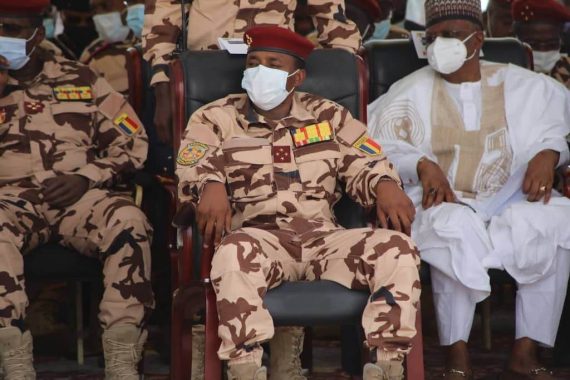In his definition of monarchical tendencies in African political culture, Professor Ali Mazrui put forward four factors. The first factor is the quest for aristocratic effect, as leaders desire large consumptions and expensive lifestyles. The second factor is the personalization of authority which in some instances goes to the extent of creating a distinct or royal title for the leader. The third factor is the sacralization of authority, which relates to personalizing authority and glorifying a leader and his office or institution. The fourth and last factor is the search for a royal historical identity motivated by a vague sense that national dignity would be lacking without a glorious past of ancient and kingly success. These factors could be seen in some African countries that practice family dynasties today.
Political dynasty exists when close family members or relatives succeed a retiring leader or president in office. It is more associated with monarchies, and political dynasty is not peculiar to Africa even though kings still reign majestically in most African countries due to their position as custodians of tradition and history of their people.
Multi-party elections and peaceful transfers of power have become more common in the continent since the 1990s, and today, among the fifty-four countries in Africa only three monarchies still maintain their monarchical status as head of state or government (Morocco, Lesotho, and Swaziland).
However, family dynasties could also be seen in some African countries. The common examples of ruling families and family dynasties in the continent are the handing over of power from fathers to sons, or from one brother to another. The current examples of sons succeeding their fathers are that of Gabon, Togo, Kenya, and Chad. In other countries with the longest-serving presidents, such as Uganda, Equatorial Guinea, and Cameroon, leaders are planning to hand power to their sons.
Family politics and ruling dynasties in Africa could be seen more in local government’s politics and state positions where candidates campaign based on their kinship or dynasty lineage.
There have been several failed plans by some presidents to make their wives the next presidents. In Zimbabwe, former leader, Robert Mugabe failed in his plan of handing power to his wife, which led to a crisis within his party ZANU-PF and the 2017 coup d’état. In South Africa, former president Jacob Zuma couldn’t influence his party, the African National Congress (ANC) during his ex-wife, Nkosazana Dlamini-Zuma’s leadership battle.
Family politics and ruling dynasties in Africa could be seen more in local government’s politics and state positions where candidates campaign based on their kinship or dynasty lineage. Yet, at the continental and national levels, the examples of Kenya, Ghana, and Chad offer a clear glimpse of ruling families and their impacts on democratic systems and politics.
In Kenya, the impacts of dynastic politics couldn’t be more overemphasized. The main political dynasties include the Moi family, the Kenyattas, and the Odingas. Although the recent political crisis has been between the current president Uhuru Kenyatta and main opposition figure Raila Odinga, and thus was considered a renewal of an old rivalry that spans two generations of Kenyan politics; their fathers, Jomo Kenyatta and Jaramogi Oginga Odinga were both revered among their tribes of Kikuyu and Luo.
They were both the country’s first president and vice president respectfully, and the rivalry between the west and east Kenyans after the country’s independence in 1963 saw the two founding figures aligning to their regions, and so they became rivals; Jaramogi Odinga was fired from the position of vice president and became the main opposition leader.
The lasting impact of this is that elections in Kenya, especially in 2013 and 2017, were two-horse races between Uhuru Kenyatta of the Jubilee Party and Raila Odinga of the National Super Alliance. Kenyatta is seen as a defender of Kikuyu interests and was accused of funding militias in the 2007 violence for which he later faced charges of crimes against humanity at the International Criminal Court (ICC) (the charges were later dropped).
Also, supporters and campaigns tend to focus on the personalities and family records of both men; Kenyatta’s political influence as the son of the first president and his family fortune all provide him with a distinct edge in elections, while on the other hand, Odinga’s supports cut across those who saw him as representing the economically and politically marginalized communities. For many Kenyans, the competition and rivalry between the two families mean choosing between Kenyatta who is the “good son” of the palace that will spend anything to protect the status quo, or between Odinga who is an underdog that will revolutionize the polity.
The implications of the family dynasty in Chad could be seen in the personification of state and national politics, constitutional amendments, and the cult of personality that revolves around the Débys.
In Chad, the ruling family has the fingerprints of military elements and foreign power support. In 1990, former president Idriss Déby, a Zaghawa of the Bideyat clan seized power and ruled the country until his sudden death in 2021 due to the injuries he sustained during clashes with northern rebels. The solution in this situation, as called for in Chad’s constitution is to hand power over to the National Assembly. However, the military and presidency disregarded the constitution and swiftly named General Mahamat, Déby’s 37-year-old son as the country leader. The unconstitutional move was also supported by many African and foreign leaders, including France who all pointed to the increase in terrorism and violent activities in Lake Chad and Sahel regions.
The implications of the family dynasty in Chad could be seen in the personification of state and national politics, constitutional amendments, and the cult of personality that revolves around the Débys. The 30-year rule of Idriss Déby is characterized by assigning family members and allies from his Zaghawa ethnic group to senior government positions.
Recommended
Chad is highly diverse ethnically, hence tearing up the constitution after the death of Idriss Déby and putting another Déby at the helm of power complicate the relationships between Zaghawa which dominates the national politics, and others. This also led to divisions within the military, and intensified the internal crisis between the ruling family, especially between General Mahamat and his brother Zakaria, who was rumored to have been one of the first in line for succession.
In Ghana, the current president, Nana Addo Dankwa Akufo-Addo, was born into a prominent family and a residence that headquartered the first political party in Ghana. Akufo-Addo’s father, Edward, grand uncle, J.B. Danquah, and uncle, William Ofori Atta were all among the “Big Six” leaders (or founding fathers) that helped Ghana gain independence in 1957. Akufo-Addo’s supporters are also quick to point to his father’s contribution to Ghana whenever the opportunity arises.
However, the case of Ghana is different from what is seen in other African nations that practice family dynasties in politics, such as Togo or Chad, because the long-established families in Ghana play by the rules. Family ties in the Ghanaian case don’t necessarily weaken the democratic institutions, as Ghana is regarded as one of the most stable democracies in Africa, and everyone still has the same chance and opportunity to run for political seats.
Through the above examples and Mazrui’s definition, one could conclude that family dynasties have their roots in African cultures which promote the continuation of legacies and expansion of kingdoms from fathers to sons. The impacts in modern democratic politics, however, are that political power is concentrated in one or few families and authority is restricted amid a few, hence political rule in a country turns into a monarchical system.
Although some might argue that family dynasties bring development and stability in some countries, the conclusion that could be derived from the realities in many African countries is that the culture of family dynasties in democratic systems will result in prioritizing family lineage and alliance over competence, weak accountability, lack of competitiveness, transparency, representation in politics and more divisions among different ethnic groups. And the end products are corruption, bad governance, and economic mismanagement.





